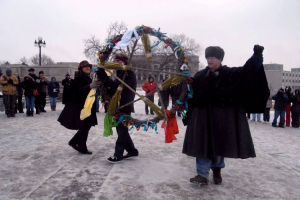University of Missouri Recognizes Pagan, Wiccan Holidays
Columbia, Missouri – Students at the University of Missouri that identify as Wiccan or Pagan have garnered recognition of their religious holidays due to the release of a new handbook for staff.
 The university’s Guide to Religions: Major Holidays and Suggested Accommodations was compiled to assist faculty in understanding the various religions that may be represented at the university as well as the holidays celebrated by these religions. It is also meant to serve as a guide in knowing when and when not to schedule exams surrounding some religious activities.
The university’s Guide to Religions: Major Holidays and Suggested Accommodations was compiled to assist faculty in understanding the various religions that may be represented at the university as well as the holidays celebrated by these religions. It is also meant to serve as a guide in knowing when and when not to schedule exams surrounding some religious activities.
“The holidays and accommodations section of this guide is provided to faculty, staff and student leaders as an educational resource for the myriad of religious holy days celebrated at Mizzou,” the document outlines. “Not only does this section offer crucial information about dates and practices, we also hope that the information about recommended academic and food accommodations will be valuable to those planning classroom activities and other academic and co-curricular events.”
Among the eight Wiccan and Pagan holidays cited in the guide include the Wiccan day Beltan, which is observed in May, and is a time of celebrating the coming of summer and fertility. Another holiday, Litha, is celebrated with bonfires and staying up all night to watch the sun rise. Samhain, which corresponds with Halloween, consists of “paying respect to ancestors, family members, elders of the faith, friends, pets and other loved ones.” Ostara, which falls around the time of Easter, also celebrates fertility by coloring eggs.
Wicca, by definition, is a religion “that affirms the existence of supernatural power (as magic) and of both male and female deities who inhere in nature and that emphasizes ritual observance of seasonal and life cycles.” Paganism is “the traditional designation of a practitioner of classical polytheisms.” It is referenced in Scripture as early as the first few books of the Old Testament in referring to those who did not worship the one, true living God.
A variety of other holidays from various religious are also noted in the guide, including Hindu, Muslim, Buddhist, Shinto and Shikh holy days — marking a total of 42 holidays that professors and other staff members need to be on the alert for when scheduling classes.
One holiday, which celebrates the Hindu god Krishna, was specifically noted to be off-limits for exams, since students celebrate far into the night.
Connect with Christian News
“Avoid scheduling major academic deadlines on this day, since it is likely that students will be operating on very little sleep,” the guide advises.
The Chinese New Year is also to be recognized.
“Avoid scheduling important academic deadlines, events and activities on this date,” the document continues. “Many Chinese employees will probably request this day off.”
In regard to Wiccan and Pagan holidays, while the days are identified and outlined in the guide, no suggested accommodations are listed, such as the avoidance of scheduling exams. However, general practices are noted, such as that “[m]aking dishes with apples, squash and pumpkins as part of ritual celebration is customary” in the observance of Mabon in September.
“The information about the Wiccan and Pagan holidays has been in the guide since last fall,” the university told reporters. “Please keep in mind that this is not intended just for faculty. This is an informational guide for anyone across campus (and beyond).” Christian News
